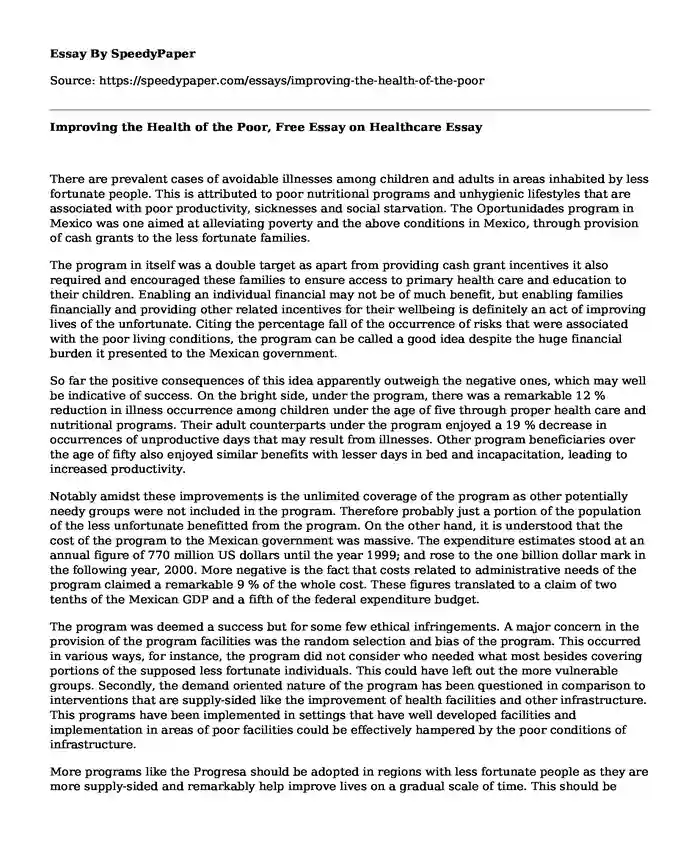
| Type of paper: | Essay |
| Categories: | Health and Social Care |
| Pages: | 3 |
| Wordcount: | 609 words |
There are prevalent cases of avoidable illnesses among children and adults in areas inhabited by less fortunate people. This is attributed to poor nutritional programs and unhygienic lifestyles that are associated with poor productivity, sicknesses and social starvation. The Oportunidades program in Mexico was one aimed at alleviating poverty and the above conditions in Mexico, through provision of cash grants to the less fortunate families.
The program in itself was a double target as apart from providing cash grant incentives it also required and encouraged these families to ensure access to primary health care and education to their children. Enabling an individual financial may not be of much benefit, but enabling families financially and providing other related incentives for their wellbeing is definitely an act of improving lives of the unfortunate. Citing the percentage fall of the occurrence of risks that were associated with the poor living conditions, the program can be called a good idea despite the huge financial burden it presented to the Mexican government.
So far the positive consequences of this idea apparently outweigh the negative ones, which may well be indicative of success. On the bright side, under the program, there was a remarkable 12 % reduction in illness occurrence among children under the age of five through proper health care and nutritional programs. Their adult counterparts under the program enjoyed a 19 % decrease in occurrences of unproductive days that may result from illnesses. Other program beneficiaries over the age of fifty also enjoyed similar benefits with lesser days in bed and incapacitation, leading to increased productivity.
Notably amidst these improvements is the unlimited coverage of the program as other potentially needy groups were not included in the program. Therefore probably just a portion of the population of the less unfortunate benefitted from the program. On the other hand, it is understood that the cost of the program to the Mexican government was massive. The expenditure estimates stood at an annual figure of 770 million US dollars until the year 1999; and rose to the one billion dollar mark in the following year, 2000. More negative is the fact that costs related to administrative needs of the program claimed a remarkable 9 % of the whole cost. These figures translated to a claim of two tenths of the Mexican GDP and a fifth of the federal expenditure budget.
The program was deemed a success but for some few ethical infringements. A major concern in the provision of the program facilities was the random selection and bias of the program. This occurred in various ways, for instance, the program did not consider who needed what most besides covering portions of the supposed less fortunate individuals. This could have left out the more vulnerable groups. Secondly, the demand oriented nature of the program has been questioned in comparison to interventions that are supply-sided like the improvement of health facilities and other infrastructure. This programs have been implemented in settings that have well developed facilities and implementation in areas of poor facilities could be effectively hampered by the poor conditions of infrastructure.
More programs like the Progresa should be adopted in regions with less fortunate people as they are more supply-sided and remarkably help improve lives on a gradual scale of time. This should be taken in utmost consideration of the financial implications it may have in an economy and the possible ethical issues that may arise from the program undertaking.
References
Levine, R. & Levine, R. (2007). Case studies in global health. Sudbury, Mass.: Jones and Bartlett Publishers.
Stanhope, M. & Lancaster, J. (2016). Public Health Nursing - Revised Reprint. Saint Louis: Elsevier Health Sciences.
Holtz, C. (2013). Global health care. Sudbury, Mass.: Jones and Bartlett Publishers.
Cite this page
Improving the Health of the Poor, Free Essay on Healthcare. (2019, Oct 24). Retrieved from https://speedypaper.net/essays/improving-the-health-of-the-poor
Request Removal
If you are the original author of this essay and no longer wish to have it published on the SpeedyPaper website, please click below to request its removal:
- Essay Example about Germany's Healthcare
- Comparison Essay Sample on Robert Frost and Langston Hughes Poems
- Focusing on the How of Violence - Article Review Essay Sample
- Theory of Forms Essay Sample
- Essay Example on M4BL Policy Platform
- Strategies for Data Collection and Establishing Trust. Essay Example
- Essay Example on Roles of a Baccalaureate-Prepare Nurse Supervising Clinical Staff Nurses
Popular categories




